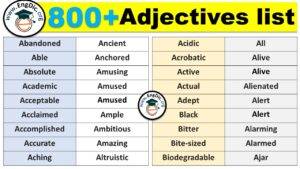
In such cases, the adjective may function as a mass noun (as in the preceding example). Another way this happens is in phrases like "out with the old, in with the new", where "the old" means "that which is old" or "all that is old", and similarly with "the new". In the sentence, "I read two books to them he preferred the sad book, but she preferred the happy", happy is a nominalized adjective, short for "happy one" or "happy book". One way this happens is by eliding a noun from an adjective-noun noun phrase, whose remnant thus is a nominalization. Nominalized adjectives, which function as nouns."My kids, happy to go for a drive, are in the back seat." "The only room available cost twice what we expected" (b) as linked via a copula or other linking mechanism subsequent to a corresponding noun or pronoun for example: " My kids are happy", wherein happy is a predicate adjective (see also: Predicative expression, Subject complement) or (c) as an appositive adjective within a noun phrase, e.g. Postpositive adjectives can occur: (a) immediately subsequent to a noun within a noun phrase, e.g.For example: "I put my happy kids into the car", wherein happy occurs on an antecedent basis within the my happy kids noun phrase, and therefore functions in a prepositive adjective. Prepositive adjectives, which are also known as "attributive adjectives", occur on an antecedent basis within a noun phrase.In English, occurrences of adjectives generally can be classified into one of three categories: Structural, contextual, and style considerations can impinge on the pre-or post-position of an adjective in a given instance of its occurrence. Types of use ĭepending on the language, an adjective can precede a corresponding noun on a prepositive basis or it can follow a corresponding noun on a postpositive basis. The terms noun substantive and noun adjective were formerly used in English but are now obsolete.

The words that are today typically called nouns were then called substantive nouns ( nōmen substantīvum).

In the grammatical tradition of Latin and Greek, because adjectives were inflected for gender, number, and case like nouns (a process called declension), they were considered a type of noun.


See also: Part of speech § History, and Noun § HistoryĪdjective comes from Latin nōmen adjectīvum, a calque of Ancient Greek: ἐπίθετον ὄνομα, romanized: epítheton ónoma, lit.'additional noun' (whence also English epithet).


 0 kommentar(er)
0 kommentar(er)
